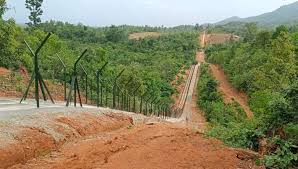Manipur Forest Division seizes 16 bird traps in Loktak Lake Anti- Poaching Operations
A joint operation by the Manipur Forest Division (Thoubal Forest Division) and local police resulted in the seizure of 16 bird-traps at the wetlands of Loktak Lake (specifically around the Turelmei and Kharung Pat areas) as part of an anti-poaching drive ahead of the migratory bird season.
The operation was supervised by DFO Leishangthem Jeeceelee and led on-ground by Range Officer Sundar Huidrom, Beat Officer Nameirakpam Bikramjit, Forester H. Sanamatum, and Waikhong Beat Officer Brojen.
Officials emphasized that the migrant birds — many coming from Tibet, Siberia, China, Europe — are beginning to arrive, and illegal trapping threatens their safety and roosting habitats.
According to the report:
• Forest Division teams acting on intelligence conducted their operation in the Turelmei and Kharung Pat (lake-wetland) zones around Loktak Lake.
• They recovered 16 bird-traps set in and around the wetlands. These traps are presumably used to capture migratory birds illegally.
• The drive was led by the Kakching Forest Range (RO Sundar Huidrom) and Pallel Beat (BO Nameirakpam Bikramjit) under DFO Leishangthem Jeeceelee.
• The department issued a stern warning: anyone found trapping or killing birds or wild animals will be prosecuted under the Wildlife Protection Act, 1972.
Frequently Asked Questions (FAQs)
Q1. Which areas around Loktak Lake were involved in the seizure?
The traps were recovered in and around the Turelmei and Kharung Pat wetlands associated with Loktak Lake.
Q2. How many traps were seized and by which division?
A total of 16 bird-traps were seized by the Manipur Forest Division, Thoubal Forest Division in a joint anti-poaching operation.
Q3. Why are migratory birds coming to Loktak Lake?
Winter-seasonal migratory birds, originating from regions like Tibet, Siberia, China and parts of Europe, come to Loktak Lake’s wetlands because they offer suitable roosting, feeding and resting habitats in the cold months.
Q4. What law applies for bird-trapping offences in Manipur?
The trapping or killing of wild birds/animals is punishable under the Wildlife Protection Act, 1972. The forest department has warned that offences will be dealt with accordingly.
Q5. How can local communities help prevent bird-trapping?
Communities can assist by: reporting traps or suspicious activity, avoiding participation in trapping, supporting village-based monitors, helping in habitat cleanup/maintenance, and promoting eco-friendly livelihoods linked to bird-watching and conservation.




